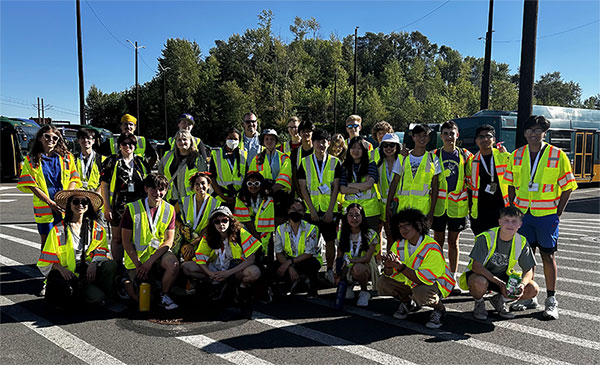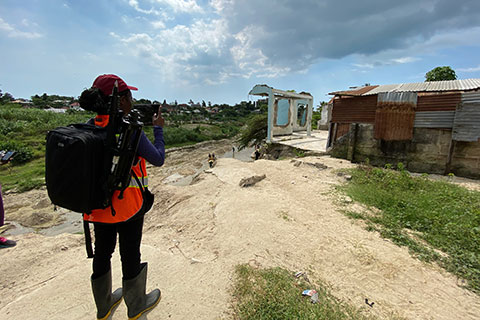December 7, 2023
PacTrans invites high school students to summer transportation camp

Summer transportation camp students stand in front of the King County Metro’s electric bus testbed.
In collaboration with the Washington State Department of Transportation (WSDOT), the Pacific Northwest Transportation Consortium (PacTrans) is working to nurture budding transportation engineers with a specialized summer camp at the UW. PacTrans's vision of bridging academic excellence with real-world experiences came to life over a five-day camp this past summer.
The program was open to Washington high school students. Attendees benefitted from onsite learning with lectures by professionals in the mornings and offsite learning with practical education in the field during the afternoon. The offsite learning excursions spanned significant transportation hubs, including the PACCAR Technical Center’s testing facility, King County Metro’s electric bus testbed and an Amazon Fulfillment Center.
As they toured different facilities, students had the opportunity to see a diverse range of transportation careers up close, from engineers working on transit solutions to logistics experts making sure operations ran smoothly. The tours were designed to allow students to see many areas of the transportation sector and ask questions to professionals in the field.
Highlighting PacTrans's commitment to statewide outreach, a concurrent camp was organized at Washington State University (WSU) for students from eastern Washington.The camp aimed to introduce high school students to the field of transportation engineering and promising careers in the sector.
HollyAnna DeCoteau Littlebull appointed assistant director of NW TTAP Center

HollyAnna DeCoteau Littlebull
In July, HollyAnna DeCoteau Littlebull joined the Northwestern Tribal Technical Assistance Program (NW TTAP) Center as its inaugural assistant director. Littlebull, a respected figure with 30 years in the public safety domain, has held roles as a medic, firefighter, police officer and educator.
Littlebull has deep-rooted expertise in traffic safety’s four E’s: engineering, enforcement, education and emergency response. She has previously served as the tribal traffic safety coordinator for the Yakama Nation Department of Natural Resources Engineering Program, where she was involved in drafting Washington state laws and tribal codes, including a pivotal child restraint law.
Littlebull's contributions to safety strategies and policy implementation have been recognized by the Transportation Research Board and the National Academies of Sciences, Engineering and Medicine.
In her new capacity at the NW TTAP Center, Littlebull plans to enhance the center’s mission to equip northwestern tribal communities with essential training and technical support, bolstering tribal transportation programs throughout the region.
RAPID maps flood resilience in East Africa

A researcher uses RAPID equipment to capture data on a flood-damaged housing structure in Dar es Salaam.
Imagine the challenges of living in a home constantly threatened by the frequent coastal storms of East Africa. For countless residents in Dar es Salaam and Mozambique, this is a distressing reality. To address this concern, Penn State University Ph.D. student Lorine Ouma spent the summer mapping out and collecting visual evidence of flood-inflicted damage with the help of researchers and equipment from the UW Natural Hazards Reconnaissance Facility, or RAPID. The hope is that these images can be used to increase future resilience of East African coastal communities.
This project was supported as part of the RAPID’s Graduate Scholars program and also as part of a research grant to Professor Esther Obonyo at Penn State. Focusing initially on Dar es Salaam, the team sought to assess the performance of building materials when exposed to flooding. By analyzing the current state of flood-related damage along the East African coast, particularly in low-income housing areas, the team members were able to chronicle the extent of damage from previous floods. They expanded their research southward, reaching the coasts of Mozambique. In the images captured, they honed in on the prevalent construction materials and post-disaster recovery measures these communities have employed. The RAPID technology did this by capturing vivid street view images and immersive 360-degree videos from the affected coastal neighborhoods. Coupling this with point cloud data—a set of data points in space collected through laser scanners—they crafted detailed 3D models. These models offer insights into the kinds of housing damage on the ground, aiming to guide future flood-prevention efforts.
The researchers chose to focus on Tanzania and Mozambique because of the escalating threats these nations face from coastal hazards. Mozambique, for instance, has weathered the devastating impacts of cyclones like Idai, Kenneth and the recent Freddy. The need for this research is heightened by the notable lack of data from this region of the world.
The team worked with Ardhi University in Tanzania and Eduardo Mondlane University in Mozambique to ensure the research included local insights and expertise. Funding for the study was provided by the National Science Foundation through the RAPID Facility and Penn State.